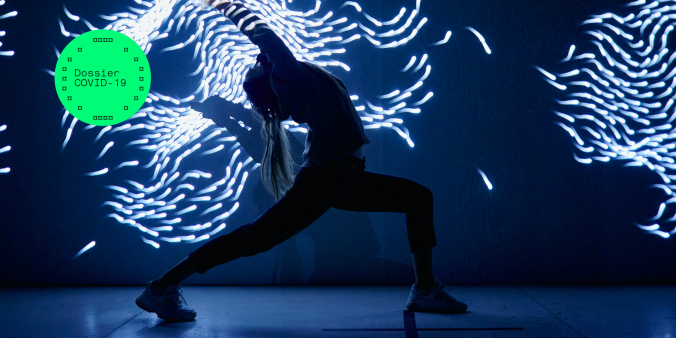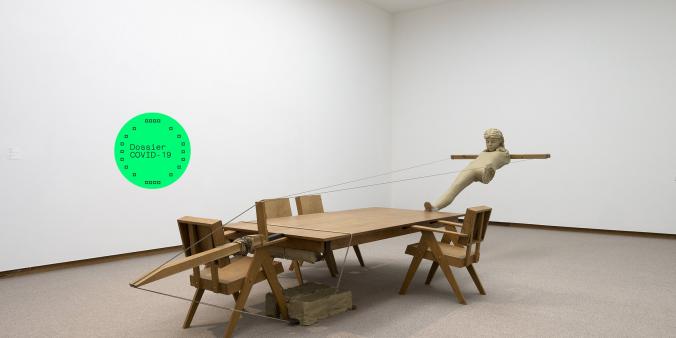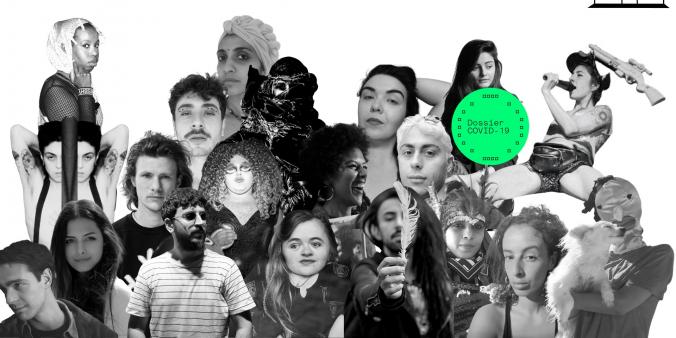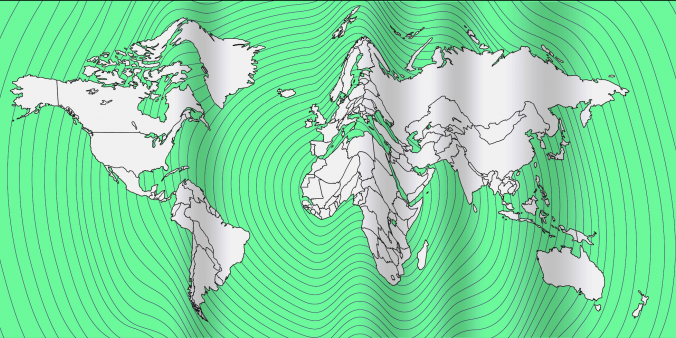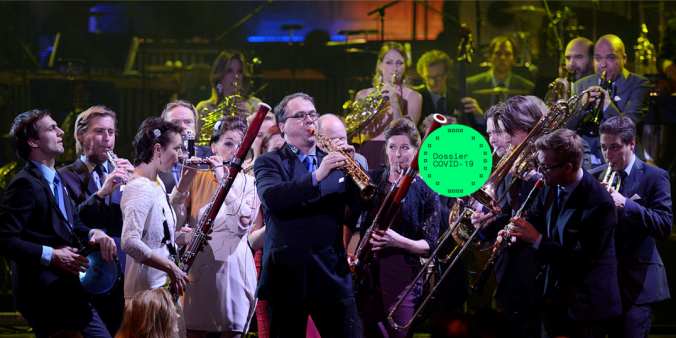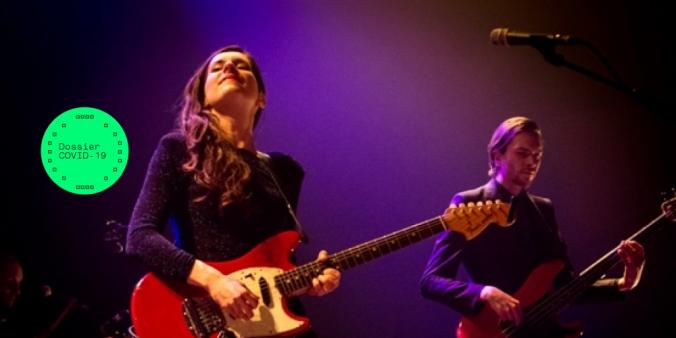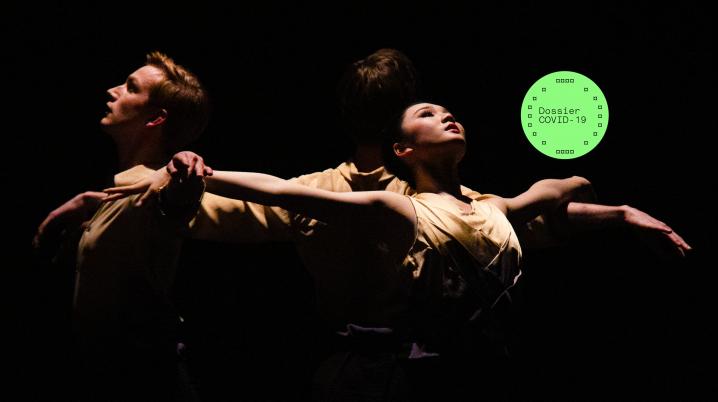
The impact of COVID-19 on cultural cooperation with Indonesia in 2020
Every year DutchCulture creates an overview of the cultural activities planned in each country in its international database. The year 2020 is no exception to the rule, albeit an exceptional year in many aspects.
Making an analysis of cultural activities in Indonesia in times of COVID-19 is not easy. Usually, you hope for bigger numbers, more activities, more interaction, but now this was not the case. The world came to a standstill in spring 2020, including all planned performances, screenings, concerts, exhibitions and training by Dutch professionals in Indonesia.
Consistent ranking
Luckily the data we collected shows that several activities did still take place in Indonesia in 2020, just much less than we have seen in previous years. In 2020, 34 Dutch artists and cultural organisations participated in 55 cultural activities across Indonesia. These activities took place at 11 venues across 7 cities in the country. Most of the activities took place online, rather than in person. To compare, in 2019 86 Dutch artists and cultural organisations participated in 225 cultural activities in Indonesia, which took place at 64 venues in 20 different cities.
When we look at the global data, we see that in 2020 a total of 8,883 activities that featured Dutch cultural professionals took place in 90 different countries. With its 55 activities, Indonesia ranked 19th in the top 50 countries with the most activities. Compared to 2019, the numbers are quite dramatic: in that year, 19,227 activities took place across 112 countries. With regards to Indonesia’s ranking, there actually was not much of a difference: the country ranked 18th in 2019.
Discipline dynamics
We have to be cautious when making a comparison between Dutch cultural activities that took place in Indonesia in 2019 and 2020 since the number of activities were that much lower in 2020 as opposed to the year before. For example, a discipline may seem to have grown or shrunk enormously in percentage, whereas it may have been consistent in the actual number of activities.
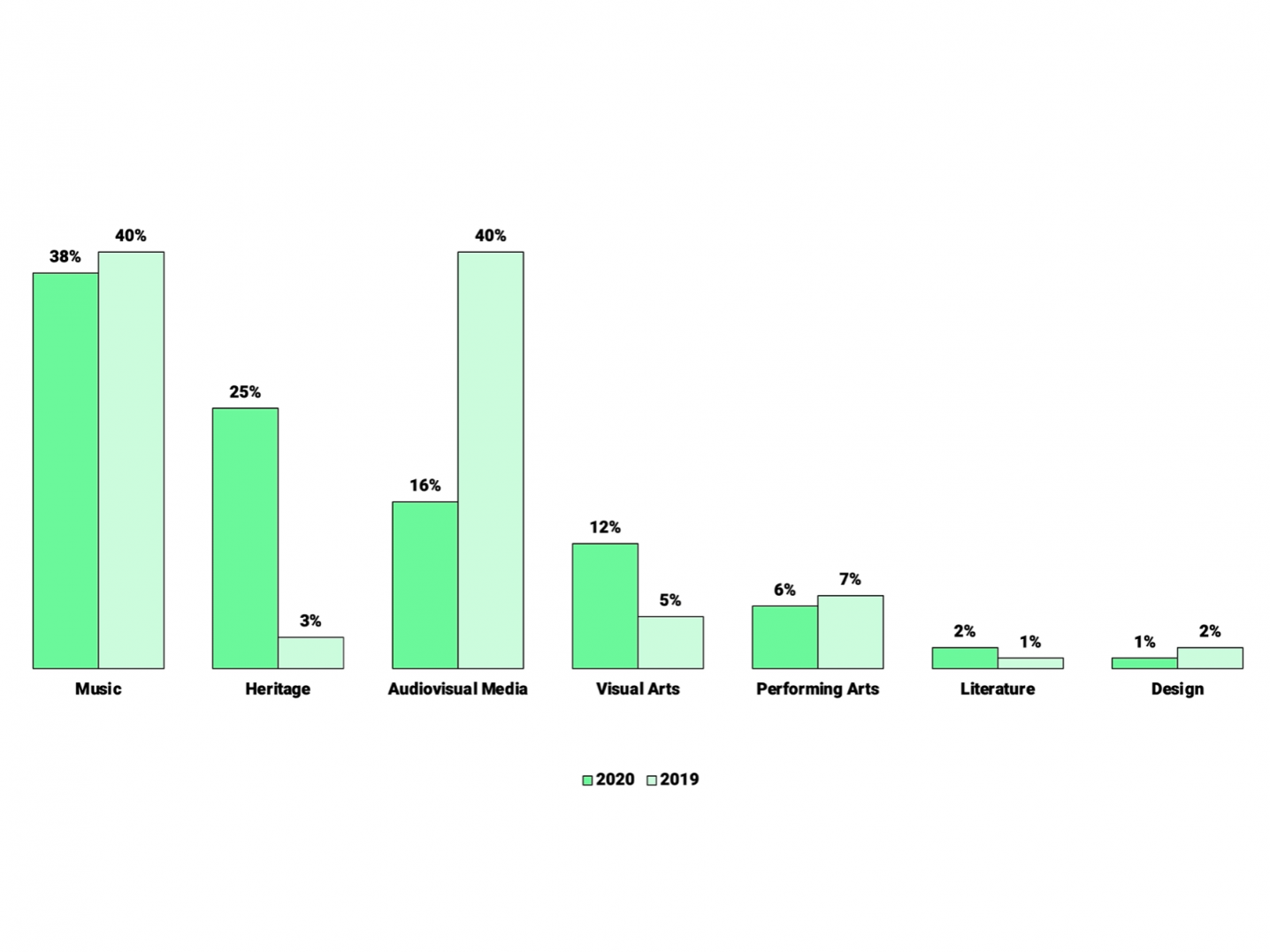
Let us go through some of the data that stand out most. Music consistently is the biggest discipline with a 40% share in 2019 and 38% in 2020. This is interesting considering all concert halls, music venues and cultural centres in Indonesia have been closed since March 2020. One explanation is that a significant number of music performances by Dutch musicians was virtualised. More on this later. Heritage projects show the biggest increase, growing from 3% in 2019 to 25% in 2020. Many of the heritage projects in 2020 have been executed by the National Archives of the Netherlands and the Cultural Heritage Agency of the Netherlands. These trainings were transferred to an online setting, others were digitisation projects which could take place despite ongoing restrictions. Another explanation can be that the heritage projects had less competition from projects from other disciplines: because those numbers dropped, the number of heritage activities may seem larger in comparison. Visual arts activities rose slightly from 5% in 2019 to 12% in 2020, whereas performing arts remained consistent with 7% in 2019 and 6% in 2020.
Audio-visual media, to which we count animations, documentaries, feature films, podcasts, short films, and television programmes, dropped from a 40% share in 2019 to a mere 16% in 2020. This is probably because there were much fewer Dutch movie screenings at the Europe on Screen festival. The 2020 edition of this film festival, the longest-running international film festival in Indonesia, was scheduled to take place in April 2020 but was eventually postponed to November 2020 in a fully online setting. Four Dutch feature films were shown, though they were viewable online for multiple days, as opposed to the screening of 74 different Dutch feature films, documentaries and shorts at the 2019 edition of Europe on Screen.

Cities and venues
To finish off, just a quick run-through of some other data. Comparing 2020 with 2019, Jakarta remains the city in which most Dutch cultural activities take place. 51 of all activities took place here; in 2019 we counted 140 activities. Yogyakarta is still in second place, with 5 activities in 2020 and 24 in 2019. Bali, Semarang and Surakarta (Solo) are among the top cities as well, both in 2020 and 2019. New top cities in 2020 are Nusaniwe on Ambon and Bandung.
When it comes to the number of activities per cultural professional, by far most professionals were involved in one activity. There are just a few cultural professionals who featured in more than one activity. The National Archives of the Netherlands organised nine digitisation and training projects. Jenny Smets, in the context of the annual Permata Photojournalist Grant, featured in five activities. The Cultural Heritage Agency of the Netherlands and the Junior Company of the National Opera & Ballet were both involved in four activities. Tin Men and the Telephone, Saskia Laroo, Halina Reijn and Annabel Laura each featured in two activities in 2020.
The top venue in 2020 was Erasmus Huis, the cultural centre of the Netherlands Embassy in Jakarta, with 33 activities. Erasmus Huis had to close its doors in spring 2020 like all the other venues and cultural centres in Jakarta but launched its online programming called e-rasmushuis in the summer. They have been sharing online concerts, sometimes live, sometimes pre-recorded, performances and screenings throughout the second half of 2020. Other top venues in Indonesia hosting Dutch cultural activities were the National Archives of Indonesia (9 activities), Europe on Screen (5), and the Indonesia Institute of the Arts of Yogyakarta (4).
Resilience in times of a pandemic
In January and February of 2020, we observed that multiple in-person activities organised with or for Dutch cultural professionals took place in Indonesia. In March the COVID-19 pandemic hit both Indonesia and the Netherlands, and all planned activities were cancelled or postponed. Up until June, there were no activities at all. From July onwards we see that increasingly online activities were hosted in Indonesia, with a peak in November. These same trends can be seen worldwide. When we look at the impact of the pandemic on the types of activities in Indonesia in 2020, we see that 42% of the activities took place in-person (primarily in January and February), that 18% of the planned activities were cancelled or postponed, and that 40% of the activities took place virtually. Compared to the worldwide data, we see that 42% of all Dutch cultural activities were in-person, 38% was cancelled or postponed and that only 20% of the activities took place virtually. So in Indonesia, there were many more virtualised events, mainly due to the Erasmus Huis’ online programming of e-rasmushuis. Another factor may be the resilience of the heritage activities of the National Archives and Cultural Heritage Agency of the Netherlands that were moved to an online setting.
In conclusion, the observations that we made with regards to Dutch cultural activities worldwide are definitely relevant for the case of Indonesia. The pandemic forced Dutch cultural professionals, but also their Indonesian partners, to embrace the possibilities of virtual events. These virtual events could attract new audiences, for example in other parts of Indonesia rather than just the big cities on Java or Bali. These events can bring in international audiences, rather than just local. In all, although the numbers are much lower than in 2019, we can conclude that the Dutch cultural activity has shown a strong level of resilience. Despite all challenges that the pandemic brought, cultural collaborations continued, and they may even have grown stronger because the challenges were addressed together, with creativity and persistence.
For a complete and most up to date overview of all cultural activities by Dutch artist and organisations, visit our Indonesia country page. Check out the full DutchCulture Database Mapping 2020 here.
Check the up to date COVID-19 situation in Indonesia here.
If you have specific questions related to your project in this country, please contact our advisor Indonesia Remco Vermeulen. For general questions you can get in touch with our Mobility Info Point.
Database disclaimer

